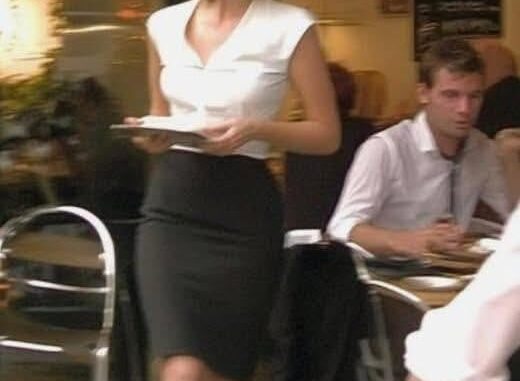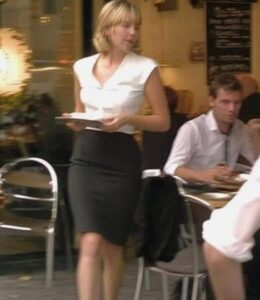
I was 38 when my parents passed away, and as their only child, it was up to me to take care of everything. It wasn’t easy, but I started going through their things, focusing on important documents and bills that needed to be settled. I planned to move into their house. It was mine, after all, and it would save me from paying rent.
That’s when I found something that would change my life completely. In a box in their closet, among old papers, was a letter addressed to me. I had never seen it before. It was accompanied by adoption papers. At 36, I had just found out I was adopted, completely by accident. My parents had never told me and I don’t think they intended to.
What was I supposed to do with that? I turned the paper over and found my birth mother’s full name and address. She lived in San Antonio.
After a few months of thinking about it, I finally gave in. I bought a plane ticket and looked her up on social media. I even found where she worked—a coffee shop, where she was a waitress and barista.
And then it happened. I was sitting in the coffee shop, looking at the woman who had given birth to me, and she had no idea who I was. I couldn’t bring myself to talk to her.
But, as life always throws surprises, something completely unexpected happened, something I could never have predicted.
I remember looking down at the menu I wasn’t really reading. My heart was pounding hard against my ribs. The door to the kitchen squeaked, and I saw her reappear with a tray of drinks. She was shorter than me, with warm brown eyes and a calm smile as she handed out lattes to a group at a nearby table.
My mind was racing: Should I speak up? Should I just leave? Just as I decided to gather my courage, I heard her call out to someone behind the bar. “Camilo! Can you bring out more almond milk?” Her voice was soft but steady. I froze, my heart quickening again.
Camilo, the young man behind the bar, rushed to the back to get what she needed. Then she turned and noticed me for a moment. She gave me the typical polite nod that servers often do. I waved slightly, thinking this was the moment I’d introduce myself. But then, another customer signaled for her attention, and she hurried away.
I couldn’t leave it at that, though. As my birth mother disappeared into the kitchen, I found my feet taking me to the restroom just to splash some cold water on my face. When I came out, I bumped into a man who was walking in from the side entrance. He had kind eyes and wore a weathered baseball cap. We apologized to each other, and he noticed how flustered I seemed.
“Hey, are you okay?” he asked gently.
I nodded. “Yeah, just… new in town, a little nervous.”
He gave me a reassuring smile. “Don’t worry. This place feels like home once you settle in. Martina—our star barista—always makes people feel welcome.”
Martina. It clicked. My birth mother’s name was Martina Delgado. Hearing someone else say it, so casually, made it real.
I tried to steady my breathing and returned to my seat. My coffee had grown lukewarm, but I sipped it anyway. It was either now or never. I caught Martina’s attention with a small gesture, and she approached.
“Everything okay?” she asked, setting down a napkin in front of me. Her hands trembled just a bit, and I wondered if she sensed something odd about me.
I cleared my throat, realizing my palms were sweaty. “Hi, um… Do you have a moment?”
She glanced at the crowded tables, then back at me. “Sure, I can spare a minute.”
“Could we maybe talk outside?” I asked, gesturing to the side door. “It’s a bit loud in here.”
Her brow furrowed. “I… guess so. Just give me a sec.”
She told one of her coworkers she was stepping out. We walked outside, where a gentle breeze made the Texas heat more bearable. I could hardly believe I was standing there, face to face with my biological mother.
I took a deep breath. “Martina, my name is Ramon,” I said, making sure not to speak too quickly. “I’m—this is going to sound crazy—but I think I’m your son.”
Her expression changed from polite curiosity to confusion. “I… I’m sorry, what did you say?”
My throat went dry. “I was adopted as a baby,” I explained, holding out the adoption papers like a shield. I kept them folded, but she could see the official seal. “All I know is your name, your address in San Antonio, and that you’re my biological mother.”
She stared at me, eyes shining with a million unspoken questions. Then, without warning, she let out a tiny gasp and took a step back, covering her mouth with one hand. For a second, she looked like she might faint.
“R-Ramon,” she stammered. “I… I don’t know what to say.”
I didn’t know how else to begin. So I told her about finding the letter, losing my adoptive parents, and everything in between. As I spoke, tears welled in her eyes. I could see the hurt, the shock, and a bit of hope flicker across her face.
“I had no choice,” she whispered. “I was so young… My family, they insisted I give you up. I never forgot you. Not for a single day.”
We both stood there, emotions swirling around us. She explained that she’d come from a very strict upbringing. She was barely out of high school when she became pregnant. Her parents believed adoption was the best path, and they pressured her relentlessly. Martina said she had wanted to keep me, but she was convinced I would have a better life if a stable couple raised me.
She started to weep, and I instinctively reached out and hugged her. It was a clumsy hug at first—two strangers clinging to each other. But I felt something shift inside me, like a missing piece of my life had just dropped into place.
We stood on the back patio for what felt like forever. Eventually, Martina pulled away, wiping tears from her cheeks. “Would you like to come to my home for dinner tonight?” she asked, her voice shaky but determined. “I mean, if you’re not busy or… I’d really love to talk more.”
I could only nod, my own throat tight with emotion. “Yes, I’d like that.”
That night, I took a cab to a modest, one-story house on the outskirts of San Antonio. Martina greeted me at the door with a smile that was both anxious and excited. The living room smelled faintly of lavender, and family pictures lined the walls. She introduced me to Camilo, the young man from the coffee shop who turned out to be her nephew. He looked stunned when Martina told him who I was. Slowly, carefully, we all sat down in the living room.
Over a homemade meal of chicken stew and freshly baked bread, Martina told me more about her life. She had married young, but the relationship ended years ago. She never had more children. She spoke about the hollow part of her heart that never quite healed after she gave me up.
In turn, I told her about my adoptive parents—how amazing they were, how they’d raised me with so much love and support. I admitted that I was hurt they never told me I was adopted, but I didn’t feel anger anymore. Grief had changed my perspective. I realized they must have been afraid of losing me or complicating our bond.
The more we talked, the more I realized that my biological mother wasn’t a stranger. There were little details—like how her laugh echoed the same unique pitch as mine, or how she squinted when she was trying to remember something. I saw parts of myself in her, and it felt surreal.
Then a moment came that I never saw coming. She walked to a cabinet and pulled out a yellowed envelope. Inside were baby pictures—pictures of me, just a few days old. She had kept them all these years.
“I managed to take a few photos before the adoption went through,” she said softly. “It was the only way I could hold on to you.”
I stared at those images of my infant self, tears prickling in my eyes. Knowing she’d kept these meant she truly never stopped thinking about me. That night, we talked until nearly dawn, sharing stories, laughter, and more than a few tears.
In the weeks that followed, Martina and I took cautious steps to build a relationship. It wasn’t perfect. There were big gaps in our shared history and moments where we both felt nervous. But we agreed to meet again, to write and call regularly, and to be patient with each other.
I also found a sense of forgiveness for my adoptive parents. The shock of discovering I was adopted so late in life was overshadowed by how loved I felt. They gave me everything they could, and I believed they kept my adoption a secret out of fear or misunderstanding. Whatever it was, I chose to honor their memory by moving forward with compassion.
And I found it in myself to forgive Martina, too. She did what she felt was best at the time, and she spent decades wondering how I turned out. In a strange twist of fate, we ended up hugging in the back of a coffee shop, connected again after years of separation.
The lesson I took from all this is that sometimes, life’s deepest answers lie in truths we’re afraid to uncover. Honesty can be painful, but it can also set us free—free to heal, free to forgive, and free to embrace new beginnings. If I had turned my back on the discovery that I was adopted, I might have missed out on knowing where I came from and experiencing the profound love of the woman who brought me into this world.
Standing with Martina now, I feel hope for the future. We can’t rewrite the past, but we can start a new chapter together, one day at a time. Everyone’s story is different, and no family is perfect, but the human heart has a remarkable capacity to mend.
Thank you for reading my story. If it touched your heart or made you think about your own journey in life, please share it and pass it along. Who knows whose life might be changed by a simple act of openness and connection? If you believe in second chances and the power of love, give this post a like and share it with someone you care about. We never know how far kindness and understanding can travel—and that’s the beauty of it all.
